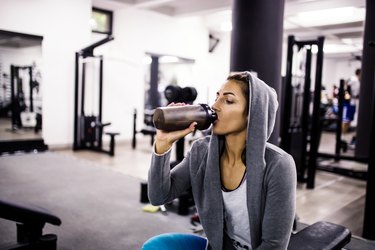
With busy schedules and limited time to meal prep, many people prefer a pre-workout shake instead of a pre-workout meal. Not only are shakes convenient, but they're easy on your stomach before a workout. Choosing the right nutrients will help you maximize your nutrition and fitness goals.
Goals of Pre-Workout Meal
Video of the Day
The goal of a pre-workout meal is to energize your muscles to fuel your upcoming workout. According to Harvard T.H. Chan School of Public Health, glucose is the body's fuel source for exercise, which comes from various types of carbohydrate foods. Simple sugars, like fruit, milk, yogurt, and honey, are easily digested compared to high-fiber carbohydrates, such as oatmeal and whole-grain bread.
Video of the Day
When making a pre-workout shake, consider using fresh fruit and milk or plant-based milk. These foods will be easily digested and reduce the likelihood of an upset stomach during the workout.
Adding protein to a pre-workout meal helps you reach your total daily protein goal and may stave off cravings and hunger during your workout. Although your muscles don't necessarily need protein before the workout, it won't hurt you either. If making a pre-workout shake with protein, consider adding pre-workout protein sources like protein powder, peanut or almond butter, Greek yogurt or silken tofu to your shake.
Protein Before or After Workout?
For years, whey protein has been the "king" of post workout recovery for helping repair muscles, improve body composition and build muscle. Whey protein is digested and absorbed into muscle faster than other proteins, like soy or pea protein.
The authors of a study published in the September 2018 issue of Frontiers in Nutrition note that consuming whey protein post-training or competition is advised for serious athletes looking to optimize performance, improve strength and muscle growth. But if you're not specifically trying to build muscle and simply want to maintain good health, then any type of protein is beneficial.
Similarly, any type of protein before a workout can help you reach your total daily protein goal. There are no reasons to justify one type of protein over another. When making a pre-workout protein shake, you can choose whey protein, vegan protein, or whole food proteins like milk or nuts.
In a position stand published in June 2017 in the Journal of International Society of Sports Nutrition, researchers found that active individuals attempting to optimize training may benefit from 1.4 to 2 grams of protein per kilogram of their body weight. For a 150-pound active person, this is around 100 grams of protein. To reach this goal, you can eat three meals with 25 grams of protein, a post-workout protein shake with 20 grams, and a pre-workout snack with 5 grams protein.
Quick Pre-Workout Shakes
When making a pre-workout shake at home, you can quickly blend a combination of carbohydrate-based ingredients like fresh or frozen fruit, fruit juice, milk or yogurt, honey or agave nectar. You can add other ingredients like flaxseed, chia seed, peanut butter, whey protein powder or even avocado. But remember these added proteins and fats will slow the digestion of the shake and you may need more time to digest before hitting the gym.
If you don't have time to make your own, look for ready to drink pre-workout shakes in your local grocery store. Be sure to look at the nutrition facts and ingredients list, as many brands are high in protein and low in carbohydrate, which may not provide your body with the optimal energy it needs to fuel your workout. If this is the case, it would be best to add a carbohydrate food like a banana, a handful of dried fruit, or small granola bar in addition to your pre-workout protein shake.
Timing of Pre-Workout Shake
To give your body enough time to digest, it is recommended to have a pre-workout meal or shake at least 30 to 60 minutes before exercise. The timing will depend on personal preference and stomach sensitivities, type of exercise, timing of exercise and size of the meal.
For example, a 400-calorie pre-workout shake may need more time to digest compared to a 150-calorie shake. Eating before exercise that jostles the intestines. For example, running and jumping requires more time to digest compared to more static exercise like traditional strength training, stretching or body building.
- Harvard T.H. Chan School of Public Health: "Carbohydrates"
- Frontiers in Nutrition: "Effects of Protein Supplementation on Performance and Recovery in Resistance and Endurance Training"
- Journal of the International Society of Sports Nutrition: "International Society of Sports Nutrition Position Stand: "Protein and Exercise"
Was this article helpful?
150 Characters Max
0/150
Thank you for sharing!
Thank you for your feedback!